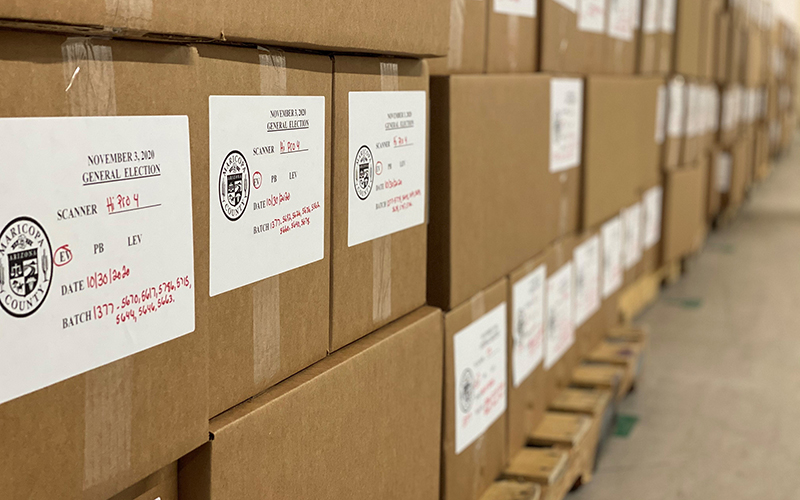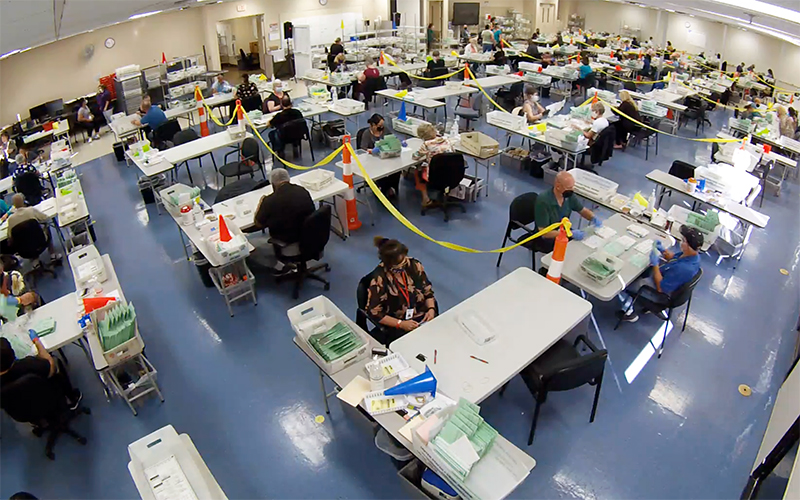
Boxes with some of the millions of early ballots received by the Maricopa County Elections Department this year, when 79.9% of registered voters in the county cast a ballot. State and national Republicans have mounted several legal efforts challenging the results of those elections. (Photo courtesy Maricopa County Elections Department)
PHOENIX – A Maricopa County judge said he would decide by Thursday morning whether to let the Arizona Republican Party proceed with its challenge to Maricopa County’s audit of ballots from this month’s election, an audit the party claims violated state law.
Maricopa County Superior Court Judge John Hannah Jr. appeared skeptical of GOP arguments that the county’s audit of ballots from its voting centers runs counter to state law, which requires an audit by precinct – even though the county did not have precinct-based voting this year.
Attorneys for the county recorder and secretary of state said election officials followed a process that has been in place for 10 years and that the GOP waited too long to file its challenge, with a canvass of the ballots due in the next few days.
The suit, filed by the Arizona Republican Party against Maricopa County Recorder Adrian Fontes and the county board of supervisors, is the latest of several GOP attempts to challenge the vote in Arizona. After voters in the normally red state backed Democrats Joe Biden for president and Mark Kelly for Senate, allegations of election irregularities began to circulate on social media, be repeated in GOP rallies and found their way into the courts.
One case brought by President Donald Trump’s campaign and state and national Republicans, claiming that voting tabulation machines erroneously rejected a little less than 200 ballots, was rejected by another Maricopa County Superior Court judge. Trump trailed Biden by 10,457 in the final unofficial returns.
The latest suit was filed just last Thursday. It charges that state law requires that “at least two percent of the precincts” in a county must be sampled for an audit of ballots after the election. But Maricopa County this year based its audit of ballots on 2% of the state’s roughly 175 voting centers, instead of its 748 precincts.
“COVID hit,” said Joseph LaRue, an attorney for the county, in explaining the county’s shift from precincts to voting centers. “This year, the county decided it would go to a vote center model exclusively. It allows for fewer polling locations, which is important during COVID.”
The defense team argued that for the past 10 years an Elections Procedures Manual issued by the secretary of state – under both Democrats and Republicans – has allowed vote centers to be counted as precincts for the purposes of a hand-count audit of ballots. Doing otherwise, they said, would be a misdemeanor under state law.
The lawsuit filed by the Arizona GOP claimed that state law requires the hand counting of votes – conducted as an accuracy check after ballot tabulating machines – to be done at Maricopa County’s precincts and not “voting centers.”
Attorneys for the county and the secretary of state argued that it could take days to separate out ballots by precinct, as the Republicans want, while elections officials have to finish their canvass of ballots by the end of this week to meet the statutory deadline of Nov. 30 to certify the results.
But Jack Wilenchik, the lead attorney for the Arizona GOP, said that sorting ballots by precinct “is something that would take them (only) hours.” In a video statement before Wednesday’s hearing, Arizona Republican Chairwoman Kelli Ward said the timing of the party’s request is no excuse.
“Simply because it’s too hard, or too late is not a good reason not to follow the law,” Ward said.
 Want more on the 2020 elections? Cronkite News, Arizona PBS and Indian Country Today have teamed up to bring you comprehensive election coverage. Click here for more.
Want more on the 2020 elections? Cronkite News, Arizona PBS and Indian Country Today have teamed up to bring you comprehensive election coverage. Click here for more.

